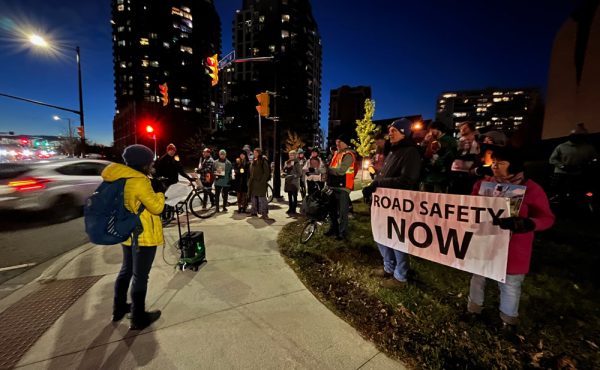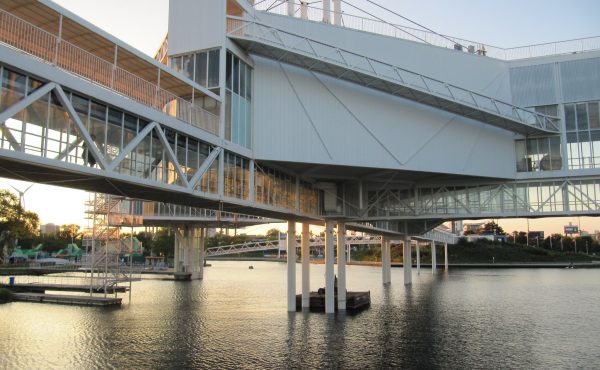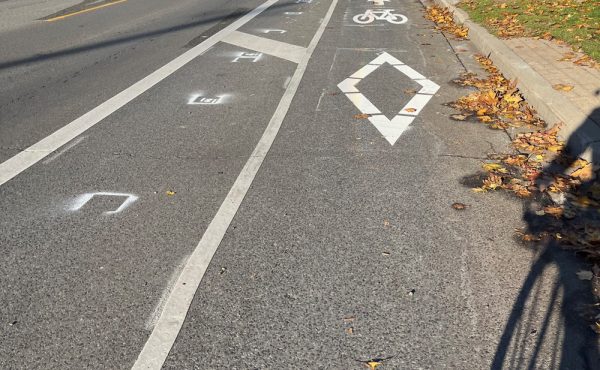On Tuesday afternoon, interventionist group Streets Are For People! celebrated Earth Day by presenting their contentious petition to the Ontario Legislative Assembly (you can read more about the petition in an earlier post). To celebrate the occasion, an enthusiastic group gathered at Kensington Market, and with flags, drums, rickshaws and petition car in tow, made their way to Queen’s Park. The goal of the affair: to get the word out to politicians, “that not one more dollar go to promote, support, or perpetuate car culture.â€
But, at about 3:20 pm, right after the taunting and scoffs that characterize question period had ended, and before several petitions were to be presented, there was a mass exodus of politicians. Of the approximately 85 MPPs present, about seven remained during the petition presentation.
Now, I’m not very familiar with the Ontario legislature and its processes, but it seems to me that that elected politicians should be listening to what their constituents are saying. After all, they are our representatives in government and is it not part of their job description to listen to the messages we are sending them be it electronically, by mail, in person, or by petition?
Aren’t petitions an important part of the political process? I remember the empowerment and control I felt the first time I signed a petition in elementary school — my name, my signature was going to be an agent for change. And, although that feeling doesn’t come over me any more, it still has that power over many people.
Petitions serve an important function in our society. After voting, petitions are probably the civic activity most people engage in. Petitions allow individuals of all walks of life — politically educated or uneducated, active or inactive — a chance to voice their opinions, as well as provide a platform where people can come together over a common concern. Petitions often reflect local issues that may or may not have wider provincial or national implications. And, with the case of the anti-car petition, petitions also have the power to instigate debate, raise questions and inspire change. Whether you agree with their message or not, petitions stimulate political engagement — and, isn’t that what democracy is all about?
“Just prior to the petition period McGuinty, swiftly followed by all the other MPPs with no petition to deliver, up and left the room — even the Speaker changed,” said Yvonne Bambrick of Streets are for People! “They clearly consider these messages from the public to be a waste of their time and a good chance for a break.â€
Photo by Yvonne Bambrick





19 comments
“Now, I’m not very familiar with the Ontario legislature and its processes, but it seems to me that that elected politicians should be listening to what their constituents are saying.”
The people who presented the petition are not likely the constituents of the majority of MPPs.
“The people who presented the petition are not likely the constituents of the majority of MPPs.”
Ahem. How would the MPPs know that exactly?
Martin, I’m sure it’s safe to say that most of the people present were from downtown ridings.
Patricia, I do not know you personally but from your writing it seems you are rather young? Why do I get this feeling Streets are for People is a youth organization?
I’m certain MPP’s understand some of the issues the group proposes–but reality, and age, can dull the effects of youthful idealism…. Essentially, SAFP is a bunch of spoilt children naively expecting a reward for their worldly ignorance! Ask your parents if they’d want to listen to a bunch of kids (strangers) showing up on their doorstep with some frivilous concerns!
Just a bit of realism here, but if you’re still in your twenties, you’ll eventually understand the realities of gov’t, grown up’s behaviour, etc.
Oh yeah, I’ve got a question: Is the Grand Am for sale? I remember when they came out in October 1991–it was the car a certain class of people aspired too.
d hays: I think it’s unfair to belittle or patronize Patricia.
Clearly her group is passionate about what it does – and the goal of getting people out of cars into other modes of transportation is one that I think a lot of us share.
I think that Sean/Mike Haddad’s comments are right. The political realities are that most constituents live in non-urban, car-centric cities, so it’s not politically advantageous for all the province’s MPPs to listen to this petition.
The good news is that higher gas prices will do more for this cause than anything SAFP or general environmental awareness might do. That being said, no reason for SAFP to keep on advocating its cause.
“Essentially, SAFP is a bunch of spoilt children naively expecting a reward for their worldly ignorance! Ask your parents if they’d want to listen to a bunch of kids (strangers) showing up on their doorstep with some frivilous concerns!”
Really, I think that comment is way over the top.
The Premier and MPPs who left were probably not going for a break, but rather to start on their piles of other work, no doubt including letters from their constituents. Premiers, Ministers and most MPPs work extremely hard and for long hours.
Most Legislature business, except for question period (which I’m guessing was what came just before the petitions) and votes, takes place with only a small number of MPPs present. All members of the legislature have to balance their considerable other responsibilities with their time in the House, which is in session for a large part of the working day. The result is there are always a few members rotating through in the legislature, but rarely a lot at once.
You do not have to be old to be cynical or young to have idealistic views.
What is disappointing is that this petition period is a time for the public’s POV to be officially heard. While Dylan is coreect that MPPs have a lot of work to do, they only sit for short periods of time and can certainly plan far ahead to leave time to sit in the Legislature and listen to petitions, especially one that was delivered on Earth Day with an enviornmental message.
Lastly, I don’t know why these commenters think the writer is part of the group: she clearly isn’t and quotes people form the group. Whenever she says “our”, its colelctive, meaning her, me, and all of you.
I wasn’t belittling Patricia. Merely pointing out that from what I recall of my student days, people shouted about Mike Harris for years but ultimately what did they achieve? (Insert whatever trendy movement of the day.)
What did those “trendy movements” achieve? The wide spread agreement (and reality) across the majority of Ontarians that the Harris Tories were wrong on almost every level (over 60% voted non-PC last election), no PC government for 8 years or more, a recognition that doing it the neo-con way does not work in Canada, governments that are finally starting to fund projects and policies that were destroyed by Harris….
So, yeah, those trendy movements got us the Liberals. That may not be great, but is much better than what we had. And those trendy movements got education in the province back on track, and much better local governments in response.
Ignoring what some people want is standard politricks aka demockery (a term from Peggy Karfilis of C4LD). And the Liberals/Gliberals/Fiberals are a bit better than the Harristocracy in many ways. It’s actually a miracle such a strong petition got read in the first place! – it’s Ontcario after all.
Pardon, I didn’t say “thanks” for the energies of the folks who actually did something of substance on Earth Day!
But I’m a Tory.:) (Well really a Libertarian but I tend to vote tory if I vote at all. Gotta support the small guy, right?) Mike Harris’s gov’t gave seed money to expand the ROM, AGO, RCM, etc. It was the Liberal Media that brain-washed the masses into believing Mike was the cause of their troubles; in reality, much of the mess originated from Bob Rae’s gov’t.
Most people tend to vote for change every so often; by 2015 it wouldn’t surprise me if the PC’s were back in power!
“Ask your parents if they’d want to listen to a bunch of kids (strangers) showing up on their doorstep with some frivilous concerns!”
Ask your parents how to spell frivolous.
No offense d hays… well, ok, a bit of offense… but if you’re going to accuse someone of being a yout’ to belittle them, you should make sure you have a better grasp on rhetorical writing than they do. Patricia’s post reads as balanced and reasoned, while you just read as sozzled.
And “listening to strangers” is precisely an MPP’s job description. Of course in reality most of them are just there to maintain power, but somehow I don’t think you were urging people to take more responsibility for their own communities rather than appealing to power. I think you were writing a half-ass screed in defense of sitting on our cynical duffs and taking potshots at anyone trying to change things, naively or not.
Take it on the road.
Mike,
That’s too easy an assumption, true or false.
But it’s convenient.
In any case, the politicians are not listening are they?
Enjoy the smog MPPs.
I’ve worked in and around government for a number of years. I can tell you that petitions are not taken seriously by anybody. It doesn’t take much effort to sign your name on a piece of paper (or, I suppose, a car body), or click a button on a website, and politicians know this. They aren’t that dumb.
A well-crafted letter from one person is likely to have far more impact than a petition signed by 10,000.
Charles> well said!
The majority of petitions never make it to the floor of the Legislature. A few years ago I tried to map out the petition process. Unless things have changed at Queen’s Park, here’s a rough look at how it works:
A dedicated and determined person, or group, spends huge effort and time mobilizing a team of like-minded people to gather signatures on a petition.
The person or group delivers the signed petitions to the office of an MPP (either at Queen’s Park or the local constituency office).
Someone on the MPP’s staff takes a look at the petition and decides whether the issue outlined therein is one the MPP might want to support ‘on the record’. If not, then the petition sits in a box until it is discarded when the MPP’s office gets too cluttered.
If the MPP chooses to support the petition, he or she might read the petition’s preamble aloud during that part of the day reserved for petitions.
If the MPP’s support for the issue is lukewarm, and may cause some embarrassment to his or her Party, the MPP may table the petition without reading it aloud.
If the petition has made it this far, the first page of the entire package(of which there may be many thousand pages) is photocopied and sent to Cabinet Office.
The petitions–that mass of paper with signatures affixed–is given a subject line in the day’s minutes, and is packed off for storage.
Someone in Cabinet Office reads the photocopy and decides which Ministry it should be assigned to.
The photocopy is sent to the communications office of the assigned Ministry.
The Ministry communications office writes a response to the petition.
The Minister signs the response and sends it back to Cabinet Office.
Cabinet Office delivers the response that it has received to the MPP who tabled, or read the petition.
The petitions–still kept in storage–are retained until the end of the session and then get boxed up and sent to the provincial archives.
In summary, the only politician who may actually see the petition is the MPP to whom it has been delivered. As for the decision-makers, the Minister is very unlikely to read or even be aware of the petition and is only obligated to sign the response within a certain period of time (check the Legislature’s Standing Orders for this, I may be wrong).
From what I gather, no-one anywhere counts the number of signatures on a petition, and the Ministry communications folks only ever see the first page so even they haven’t a clue about how many people may have signed it.
Hope this doesn’t spoil your day.
Puffer fish.
the point of this petition was well served, to fan the flames around the subject of car culture and it’s ill effects. that it created discussion from a grass-roots level while engaging ontarians and many other earthlings is exactly where its power lies. that it’s a bloody fun way of challenging the status quo is pure bonus.
streets are for people! is well aware that democracy does not exist in the tyranny of any western, corporate lackey governement. it is important to work with the system to expose how ineffectual “write-a-letter-to-your-politician” bullshit can be.
at the same time, rosario came out to the lawn to accept the petition, at the city level, adam is working on our side. unfortunately, most of the rest of them are in exxon-mobil and general motors’ pockets because they can only think about the next term in office, not the next generation.
as far as being “spoilt children”, the cool youth that pushed the petition car were indeed in their teens. the core of the streets! bicycle gang are 20 – 40 years old, a couple of them soon to be parents. they work, pay taxes and are certainly not strangers on any government doorstep.
shamez
streets are for people!